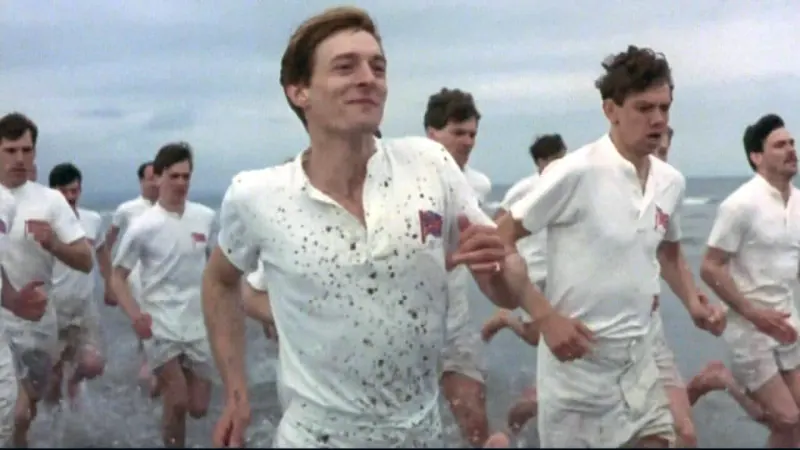Vangelis' Classic Soundtrack Theme
In Writing Screenplays that Sell, Michael Hauge singles out Chariots Of Fire (1981) as a cinematic outlier. It was an unlikely movie to generate big box office. Why? It is a biographical period piece, lacks high concept, and is set outside the US.
Chariots of Fire was hugely successful, though. It ended up making nearly $60 million at the US box office alone. It also won four Academy Awards, one for its original score.
Thirty-five years on, I am curious to find out if movie and soundtrack still work.
RUNNING MEN
The first half of the story takes place in Cambridge from 1919, and shows Jewish student Harold Abrahams’ determination to counter the prevailing anti-Semitism, by proving he is the university’s best runner: “I’m gonna take them on, all of them, one by one, and run them off their feet.” The second half is best summarised by this logline on IMDb: “Two British track athletes, one a determined Jew and the other a devout Christian, compete in the 1924 Olympics.”
The movie still entertains, mostly because of the sheer obsession of its main players. And running is in a way very cinematic. Tom Cruise has known this all along.
MESSAGE FROM ABOVE
It’s not that hard to see what this is about. As the act one curtain falls, in a textbook declaration of the hero’s objective – the ‘Outer Journey’ if you wish – Abrahams vows to “run them off their feet.” It is a fairly open goal, but in good tradition, the mid-point will specify it further as ‘winning at the Olympics’.
While adversary Liddell runs because he finds his inspiration within, in his faith (“when I run, I feel His pleasure”), for Abrahams the motivation lies external. It is all about how others perceive him. His faith defines him, too - but negatively. He wants to fight prejudice by proving himself worthy, through running – to an Oscar®-score.
SLO-MO ON THE BEACH
Synthetic soundtracks usually don’t age very well, and their composers rarely achieve more than cult status, e.g. Carpenter, Moroder, Wendy Carlos (for Kubrick), Tangerine Dream (for Michael Mann) and Vangelis. But did you know that Hans Zimmer’s early scores were largely synthesizer-based?
At the opening credit, my fear was confirmed. As we see the Cambridge men running on the beach in slow motion, over Vangelis’ main theme, I cringe. The tune has been played to death, to a point that it distracts.
That opening image with the famous tune may be what most punters remember about the movie, but it’s also devoid of emotion. We don’t know these guys yet. Pretty pictures, but we don’t really care. To my surprise however, the rest of the score holds up fairly well, and one scene in particular jumps out.

RUNNING WITH SYNTHS
Abrahams and Liddell meet for the first time in London in June 1923, when they race against each other in a British open. Liddell beats Abrahams, who takes it extremely badly.
Over the rhythmic clapping of the grandstand seats, sharp electronic shards from the legendary Yamaha CS80 synthesizer emphasise our Hero’s pain, alternating with more subtle filtered ‘pads’.
In that moment, Sybil appears, to comfort her lover. Now we see what our Hero’s real problem is: “I don’t run to take beatings. If I can’t win, I won’t run.” She realises it is all about his ego, and this is exactly what he needs to resolve before the movie is over.
“Ring me when you’ve sorted that one out. Try growing up.”
-Karel Segers
Karel Segers
Karel Segers wrote his first produced screenplay at age 17. Today he is a story analyst, script editor and producer with experience in rights acquisition, script development and production. His
screenwriting classes have trained writers in Australia, Europe, Asia and the Middle East, and his clients include international award-winning filmmakers as well as three Academy Award nominees.
Karel is the founder of
The Story Department and he ranks in the world's Top 10 of most influential people for screenwriting on Twitter.